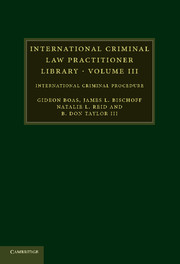Book contents
- Frontmatter
- Contents
- Foreword
- Table of authorities
- Table of short forms
- 1 The nature of international criminal procedure
- 2 Creation and amendment of rules of international criminal procedure
- 3 Procedures related to primacy and complementarity
- 4 Investigations, rights of suspects, and detention
- 5 Defence counsel, amici curiae, and the different forms of representation of accused
- 6 Pre-trial proceedings
- 7 Trial proceedings
- 8 The role and status of victims in international criminal procedure
- 9 Evidence
- 10 Judgement and sentencing
- 11 Appeal and revision
- 12 Conclusion
- Index
- References
9 - Evidence
Published online by Cambridge University Press: 05 August 2011
- Frontmatter
- Contents
- Foreword
- Table of authorities
- Table of short forms
- 1 The nature of international criminal procedure
- 2 Creation and amendment of rules of international criminal procedure
- 3 Procedures related to primacy and complementarity
- 4 Investigations, rights of suspects, and detention
- 5 Defence counsel, amici curiae, and the different forms of representation of accused
- 6 Pre-trial proceedings
- 7 Trial proceedings
- 8 The role and status of victims in international criminal procedure
- 9 Evidence
- 10 Judgement and sentencing
- 11 Appeal and revision
- 12 Conclusion
- Index
- References
Summary
From the very first version issued at the ICTY in 1994, proceedings at each of the major international criminal tribunals have been governed in part by a body of rules termed the ‘Rules of Procedure and Evidence’. Although this title may suggest that evidentiary law is given roughly equal treatment in these provisions as other areas of procedure, this is far from the case. The ICTY Rules contain 164 rules with multiple paragraphs and subparagraphs, but only seventeen pertain to the manner in which proposed evidence becomes part of the trial record and the factual basis on which the final judgement rests. The 157 provisions in the ICTR Rules include only fourteen such provisions; the 225 provisions in the ICC Rules list only thirteen, with fewer than a handful of additional relevant provisions in the Rome Statute and Court Regulations; and of the SCSL Rules' 141 provisions, a mere fourteen relate to the law of evidence. As the jurisprudence interpreting these provisions amply demonstrates, their sparseness is no accident. To the contrary, the rules are drafted and applied to ensure maximum flexibility for chambers in their efforts to run fair and expeditious trials.
This chapter examines the law governing the presentation, admission, and evaluation of evidence in trials at the ICC, ICTY, ICTR, and SCSL. Section 9.1 reviews the guidelines established by the governing instruments and case law of these tribunals to cabin the broad discretion granted to chambers to admit evidence and weigh that evidence in the course of deliberations.
- Type
- Chapter
- Information
- International Criminal Law Practitioner LibraryInternational Criminal Procedure, pp. 335 - 374Publisher: Cambridge University PressPrint publication year: 2011

